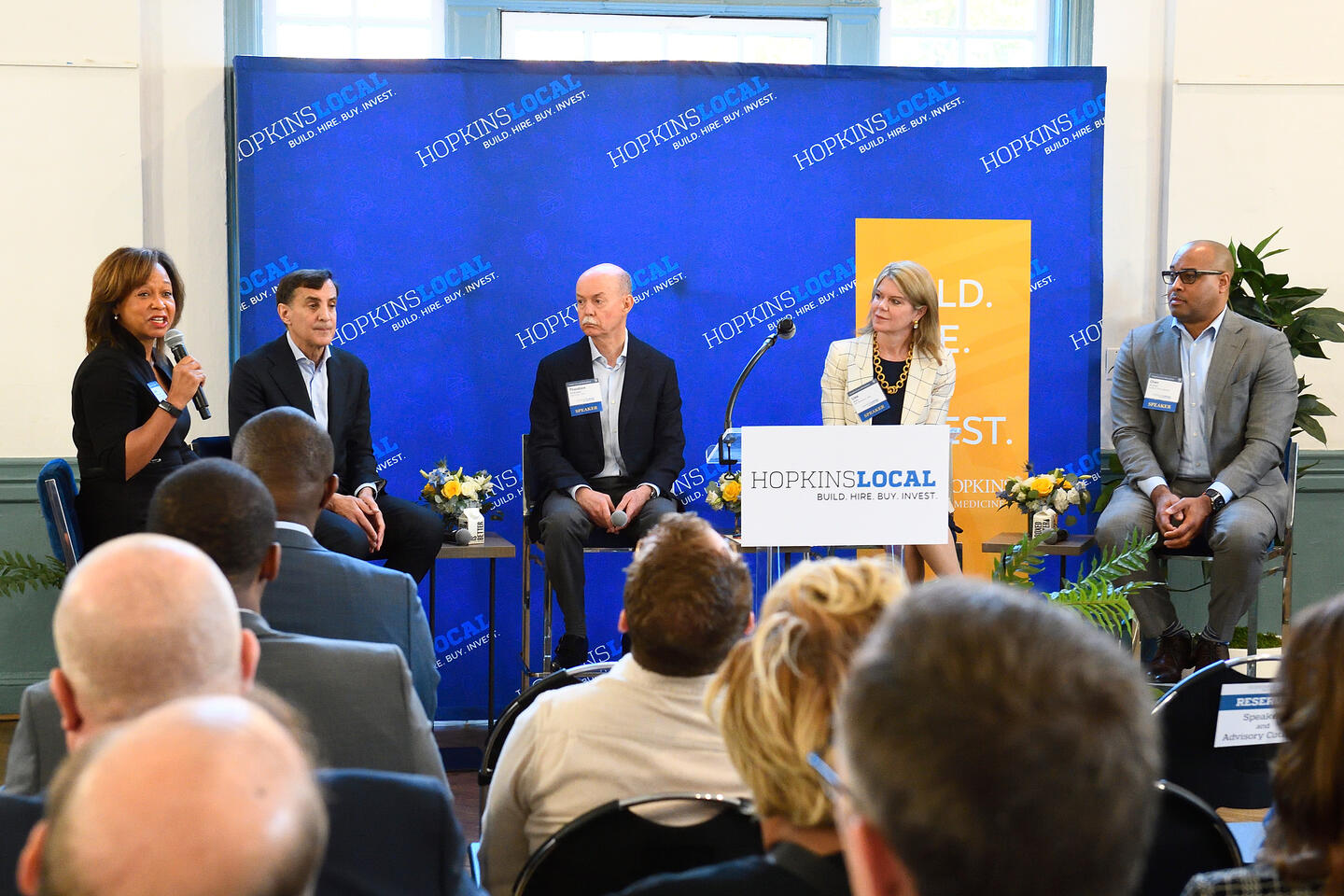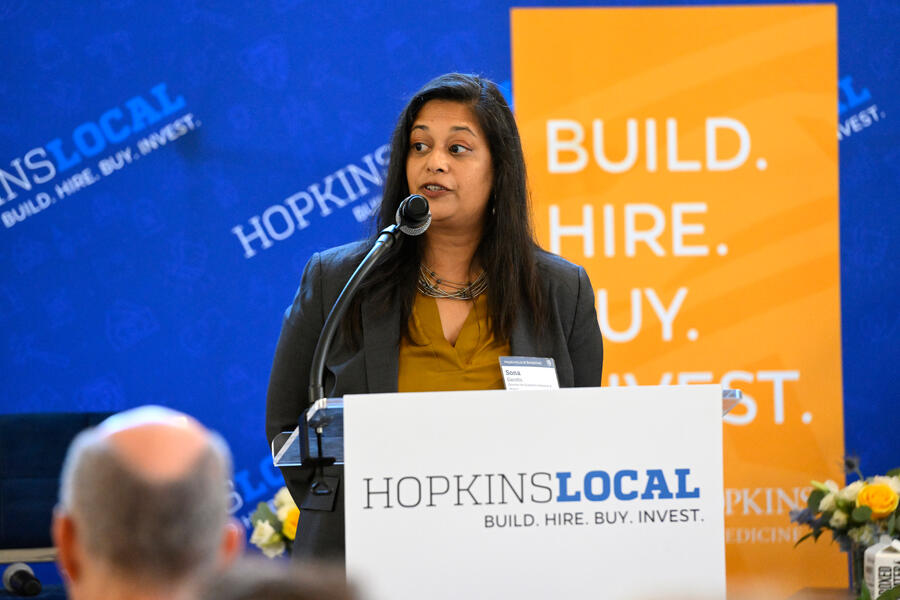- Name
- Doug Donovan
- dougdonovan@jhu.edu
- Office phone
- 443-997-9909
- Cell phone
- 443-462-2947
Leaders from Johns Hopkins, state and city government, and the local business community gathered Thursday morning on JHU's Homewood campus to celebrate the success of the HopkinsLocal initiative to expand the economic impact that the university and health system has across Baltimore.
Since its launch in 2015, HopkinsLocal's four-pronged mission of "Build, Hire, Buy, Invest" has resulted in the university and health system spending $1.05 billion with Baltimore businesses, committing $360 million to local businesses and $308 million to minority-owned businesses for design and construction projects, hiring more than 4,200 local residents, and assigning more than $287 million to diverse and women-owned investment firms.
"As we approach the 10th anniversary of HopkinsLocal next year, it is clear that our commitment to Baltimore has never been stronger," said Sona Gandhi, Johns Hopkins director of economic inclusion and impact. "Today we see the success of those efforts, not just in terms of numbers, but in the individuals who have found employment, local entrepreneurs who have grown their businesses, and the partnerships we have made in the community."
Video credit: Aubrey Morse / Johns Hopkins University
State Sen. Cory McCray, a Democrat who represents the 45th District in the Maryland General Assembly, praised Hopkins for its community impact on education with the Henderson-Hopkins School, on city housing by incentivizing employees to buy Baltimore homes, and on job opportunities as the city's largest private employer. He also commended the university and health system for using their purchasing power to benefit local businesses.
"There's not one day that I wake up that I don't put Baltimore first. And that's exactly what I see demonstrated when we're talking about HopkinsLocal," McCray said. "Every time I look, you're betting on Baltimore. Thank you, thank you, thank you Johns Hopkins for betting on Baltimore."
Johns Hopkins University President Ron Daniels told attendees at the event in Levering Hall that he, too, personally bet on Baltimore when he moved to the city in 2009.
"And I just feel so proud to be here and be part of this, and understanding—like so many of us at Hopkins—right from the get-go: So goes Baltimore, so goes Hopkins; that we're inextricably tied to one another," Daniels said. "And so from the very moment I got here, the question was, 'How could we requit that bet on Baltimore? How can we deepen our ties to Baltimore?'"

Image caption: From left to right: Maria Harris Tildon, Ron Daniels, Theodore DeWeese, Lisa Ishii, and Cheo Hurley, founder and CEO of THG Companies.
Image credit: Will Kirk / Johns Hopkins University
The impact of HopkinsLocal is the direct result of intentional efforts to ensure Hopkins employees empowered to hire or to buy consider local prospects, and that there are accountability measures to track how frequently they are doing so.
"It's about empowering and enhancing opportunity for the Baltimore community," said Theodore DeWeese, dean of the medical faculty and CEO of Johns Hopkins Medicine. "When you do those things together, you start to move the needle."
Lisa Ishii, senior vice president of operations for the Johns Hopkins Health System, said that reorienting purchasing and hiring processes toward a more local focus "wasn't easy" but that continued growth in hiring and purchasing is expected as more divisions take advantage of HopkinsLocal resources.
"If you look at the trajectory over time, we're seeing an acceleration," Ishii said. "So we know we can achieve even more in the next 10 years than we did in the previous 10 years."
Representatives of several businesses attended the event to attest to how they have benefited from that collaboration.
Debra Nelson, career services manager for Goodwill Industries, said Johns Hopkins hired more than 100 of her clients, and those individuals have maintained a 96% retention rate in their Hopkins jobs.
Matthew J. Williams, co-owner of Mount Royal Soaps, praised Hopkins for hiring his Remington company to provide hand sanitizer to the medical system, a contract that helped lead to the firm's expansion from a 200-square-foot production space to opening a 10,000-square-foot production space near Druid Hill Park.
"I owe a huge debt of gratitude to Johns Hopkins," Williams said.
Cheo Hurley, president of THG Companies, said he graduated in 2017 from the BLocal BUILD College, a Hopkins-supported program designed to help local minority- and women-owned businesses excel. Hurley's Baltimore-based general contracting and construction company has been able to expand thanks to subcontracts it has won through companies such as Mahogany Inc., one of Johns Hopkins' biggest minority contractors.
He said the company has parlayed its experience and connections with Hopkins into about $6 million in Hopkins-related contracts, deals that allow him to pay his workers a living wage and should help him grow into a prime contractor.
"We work here on the campus, we work at the hospital, we work at [the Applied Physics Laboratory]," Hurley said. "We need encouragement, we need help, we need cash flow, we need contracts, we need all these things, and I'm glad to see Johns Hopkins" provide that.
Maria Harris Tildon, vice president of government, community and economic partnerships at Johns Hopkins, encouraged all Hopkins departments to take advantage of the resources available through HopkinsLocal. This includes TealBook, a tool that can pair certified vendors with Hopkins purchasing agents buying products, equipment, and services.
"We need everyone of you to actively support the next phase of HopkinsLocal—whether its through purchasing, hiring, or partnering with local business," Harris Tildon said. "Together we will continue to create opportunities, build strong partnerships, and support communities we serve. Let's keep the conversation going and ensure that HopkinsLocal remains a driving force for positive change in Baltimore."
Posted in University News, Community
Tagged community, hopkinslocal








